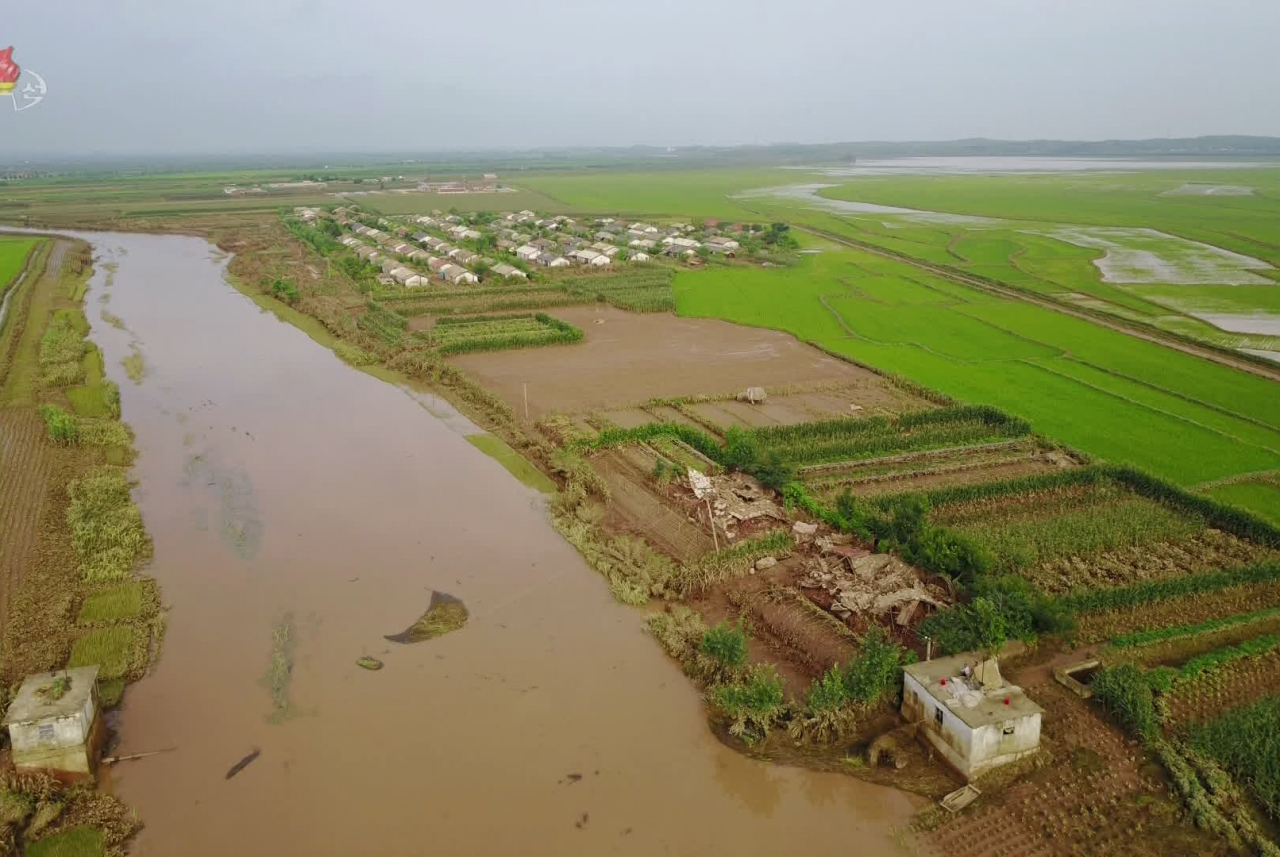
North Korea is gearing up for another deluge of torrential rain this week, with its houses and rice fields already severely flooded, in another blow to the regime grappling with the COVID-19 pandemic and a flailing economy under international sanctions.
“Heavy rain is expected through Sunday and Monday, with mid-level flood warnings issued for the Hwanghae provinces, Kaesong City and Kangwon Province,” the official Korea Central News Agency said Saturday, just a day after reporting on damage from earlier storms.
The Hwanghae and Kangwon provinces were the regions most affected by floods. Nearly 730 homes and 600 hectares of rice fields in Unpa County, North Hwanghae Province, south of Pyongyang, were submerged.
“Those regions – Hwanghae, Kangwon provinces and Kaesong City - will see another round of torrential rain shortly,” the KCNA reported, quoting a senior official in charge of weather forecasts.
The cumulative rainfall in North Hwanghae Province in the first week of August was the third highest in the country at 373 millimeters, after Kaesong City and Kangwon Province, which topped the list at 423 millimeters, according to the KCNA.
The North Korean military was mobilized in North Hwanghae Province, the country’s principal agricultural region, to help with recovery efforts primarily aimed at minimizing crop damage, two days after leader Kim Jong-un’s visit.
Earlier Kim was shown to be encouraging the displaced residents there and instructing his party aides to prepare food and shelter, in pictures released by the KCNA, which reported that Kim ordered officials to provide displaced residents with grain from his own reserves.
North Korea has historically been vulnerable to flooding due to poor drainage, infrastructure and rampant deforestation, raising concerns about food security as rain pounds the summer harvest season.
At least 138 North Koreans died and 400 remained missing in 2016, after the country’s worst flooding in its history, according to data from the United Nations.
Seoul’s Unification Ministry said the government would resume humanitarian assistance for North Koreans affected by the floods, despite the bumpy bilateral ties.
By Choi Si-young (siyoungchoi@heraldcorp.com)
“Heavy rain is expected through Sunday and Monday, with mid-level flood warnings issued for the Hwanghae provinces, Kaesong City and Kangwon Province,” the official Korea Central News Agency said Saturday, just a day after reporting on damage from earlier storms.
The Hwanghae and Kangwon provinces were the regions most affected by floods. Nearly 730 homes and 600 hectares of rice fields in Unpa County, North Hwanghae Province, south of Pyongyang, were submerged.
“Those regions – Hwanghae, Kangwon provinces and Kaesong City - will see another round of torrential rain shortly,” the KCNA reported, quoting a senior official in charge of weather forecasts.
The cumulative rainfall in North Hwanghae Province in the first week of August was the third highest in the country at 373 millimeters, after Kaesong City and Kangwon Province, which topped the list at 423 millimeters, according to the KCNA.
The North Korean military was mobilized in North Hwanghae Province, the country’s principal agricultural region, to help with recovery efforts primarily aimed at minimizing crop damage, two days after leader Kim Jong-un’s visit.
Earlier Kim was shown to be encouraging the displaced residents there and instructing his party aides to prepare food and shelter, in pictures released by the KCNA, which reported that Kim ordered officials to provide displaced residents with grain from his own reserves.
North Korea has historically been vulnerable to flooding due to poor drainage, infrastructure and rampant deforestation, raising concerns about food security as rain pounds the summer harvest season.
At least 138 North Koreans died and 400 remained missing in 2016, after the country’s worst flooding in its history, according to data from the United Nations.
Seoul’s Unification Ministry said the government would resume humanitarian assistance for North Koreans affected by the floods, despite the bumpy bilateral ties.
By Choi Si-young (siyoungchoi@heraldcorp.com)








![[Graphic News] More Koreans say they plan long-distance trips this year](http://res.heraldm.com/phpwas/restmb_idxmake.php?idx=644&simg=/content/image/2024/04/17/20240417050828_0.gif&u=)
![[KH Explains] Hyundai's full hybrid edge to pay off amid slow transition to pure EVs](http://res.heraldm.com/phpwas/restmb_idxmake.php?idx=644&simg=/content/image/2024/04/18/20240418050645_0.jpg&u=20240419100350)






![[From the Scene] Monks, Buddhists hail return of remains of Buddhas](http://res.heraldm.com/phpwas/restmb_idxmake.php?idx=652&simg=/content/image/2024/04/19/20240419050617_0.jpg&u=20240419175937)

![[KH Explains] Hyundai's full hybrid edge to pay off amid slow transition to pure EVs](http://res.heraldm.com/phpwas/restmb_idxmake.php?idx=652&simg=/content/image/2024/04/18/20240418050645_0.jpg&u=20240419100350)

![[Today’s K-pop] Illit drops debut single remix](http://res.heraldm.com/phpwas/restmb_idxmake.php?idx=642&simg=/content/image/2024/04/19/20240419050612_0.jpg&u=)